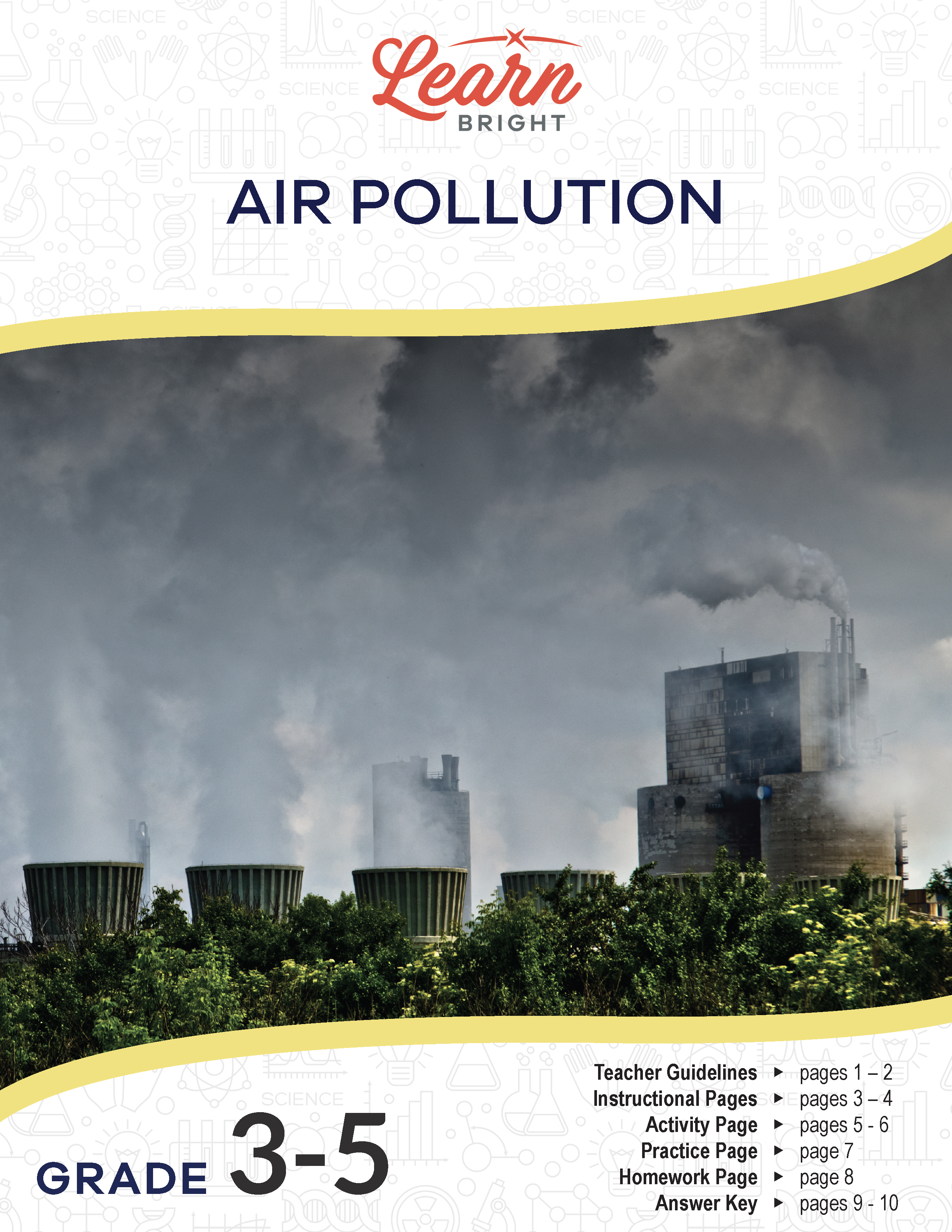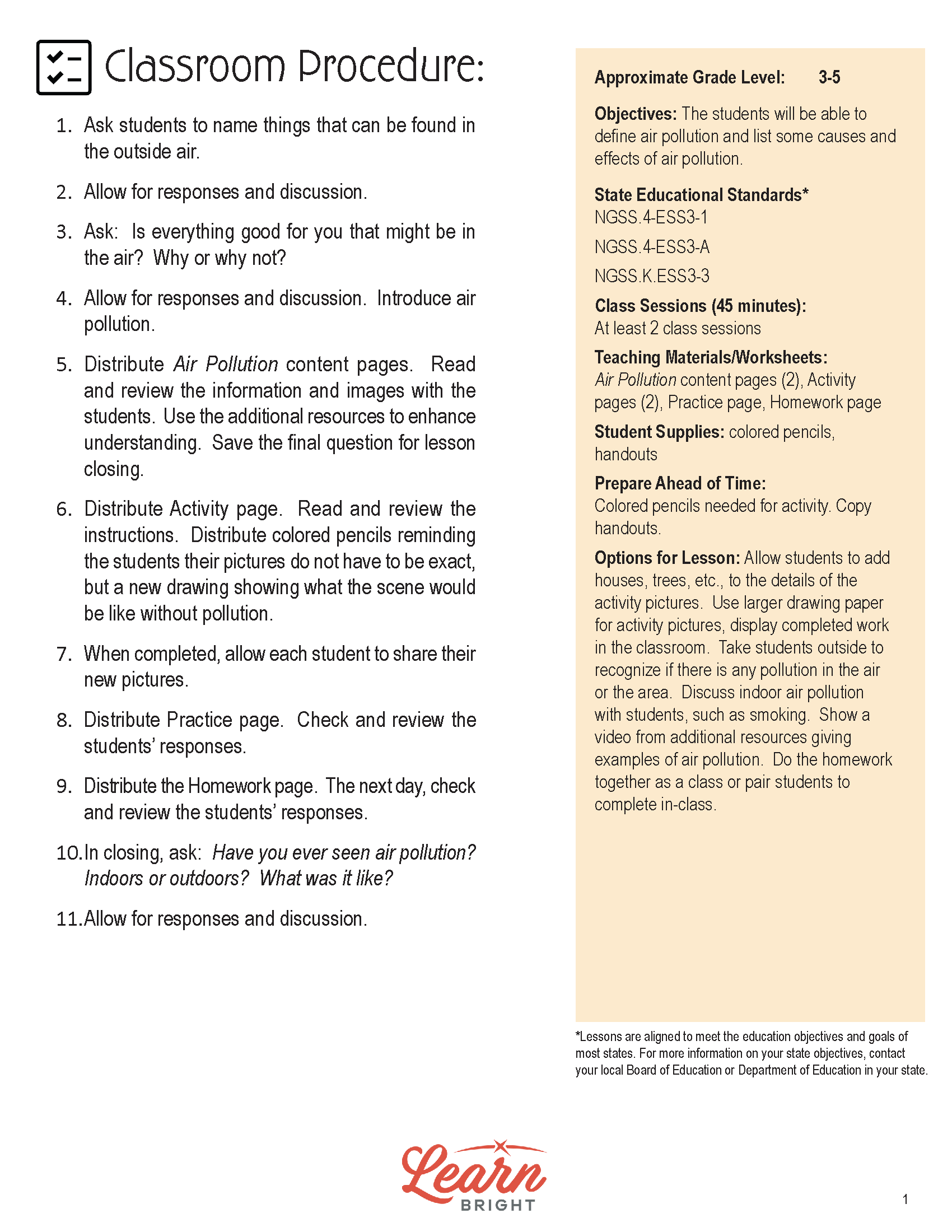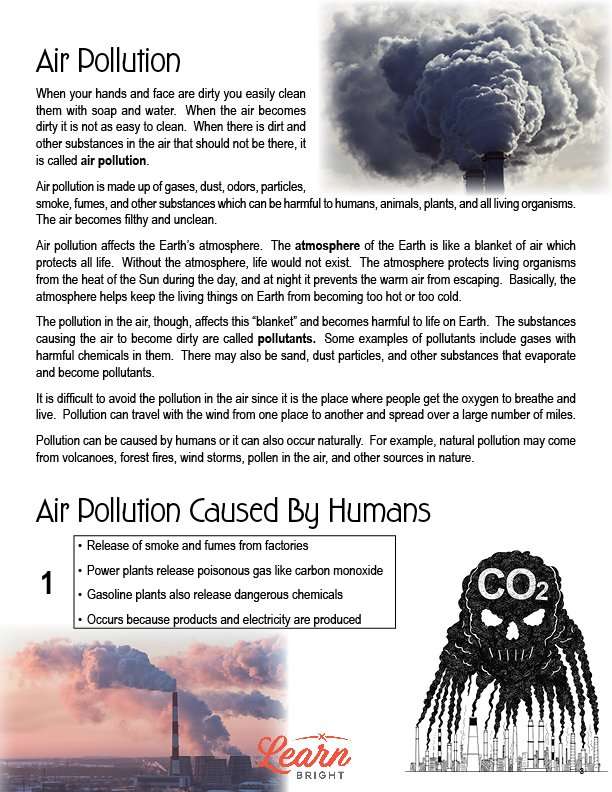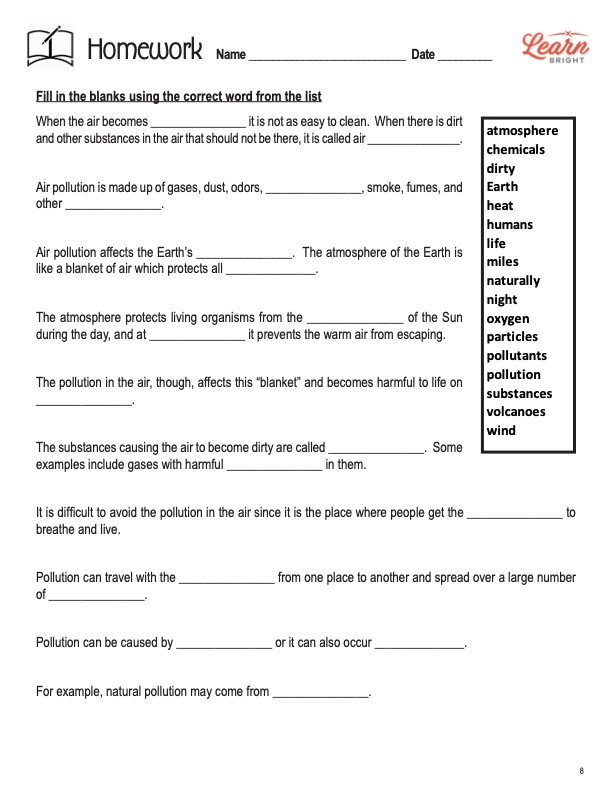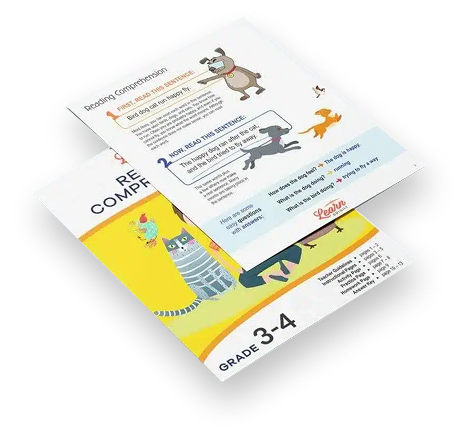Description
What our Air Pollution lesson plan includes
Lesson Objectives and Overview: Air Pollution explores the causes and effects of pollution in the air. Students will define the term and explain it clearly, including the causes and effects. Students will also discover how they can help improve the air quality of their environment. This lesson is for students in 3rd grade, 4th grade, and 5th grade.
Classroom Procedure
Every lesson plan provides you with a classroom procedure page that outlines a step-by-step guide to follow. You do not have to follow the guide exactly. The guide helps you organize the lesson and details when to hand out worksheets. It also lists information in the yellow box that you might find useful. You will find the lesson objectives, state standards, and number of class sessions the lesson should take to complete in this area. In addition, it describes the supplies you will need as well as what and how you need to prepare beforehand. The only supplies you will need in addition to the handouts are colored pencils. You may choose to have students use larger drawing paper for the activity as the option suggests in the “Options for Lesson” section. In this case, you’ll need to source drawing paper as well.
Options for Lesson
The “Options for Lesson” section lists several ideas for additional activities or tasks to incorporate into the lesson if you have time or want to extend the lesson further. One option that relates to the activity suggests you allow students to add houses, trees, and other details to the activity pictures. Another option is to use larger drawing paper for the activity and display students’ work around the classroom. You could also take students outside to see if they can recognize any signs of air pollution in the area. Another suggestion is to discuss indoor air pollution and its causes, such as smoking. One more idea is to watch a video with the students that shows examples of air pollution. Instead of having students complete the homework assignment alone at home, another option is to complete it together either as a class or in pairs.
Teacher Notes
The teacher notes page provides an extra paragraph of information regarding the lesson plan and its expectations. It suggests discussing other types of pollution once students understand the general concept. It also points out that using images of pollution will better help students understand the material clearly. Use the blank lines on the page to write down any ideas or thoughts you have before giving the lesson.
AIR POLLUTION LESSON PLAN CONTENT PAGES
What Is Pollution?
The Air Pollution lesson plan contains two pages of content. The first page introduces the concept of pollution using an analogy. When someone’s hands and face get dirty, they can easily wash them with soap and water. However, when the air becomes dirty, it is far less easy to clean up. The dirt and other substances in the air that should not be there make up what we call air pollution.
Besides dirt, air pollution includes dust, gases, odors, particles, smoke, fumes, and other things that are harmful to humans, animals, plants, and all other living organisms. It affects the earth’s atmosphere in a negative way. The atmosphere is like a blanket of air that protects all life on the planet. It protects the earth from the heat of the sun during the day and ensures the warm air doesn’t escape at night. It basically keeps the earth balanced so that it doesn’t get too hot or too cold. In fact, without the atmosphere, life could not exist.
The pollutants that affect the atmosphere are difficult to avoid. After all, we breathe in the air to survive. Pollution can travel with the wind from one place to another and spread over many miles. The causes of pollution are both natural and manmade. Examples of natural causes include volcanic eruptions, forest fires, wind storms, and pollen.
Air Pollution from Humans
Students will discover that there are quite a few ways that humans have contributed to the pollution in the air. The lesson outlines a few examples: factories, cars, and cleaning products. Factories release smoke and fumes. Power plants even release poisonous gases, like carbon monoxide.
Cars burn fuel, such as gasoline, oil, and other products. They then expel exhaust into the air through the exhaust pipes. People use transportation every day, and not just cars. They also use trucks, trains, buses, and airplanes. All of these vehicles release pollution into the air. In fact, one type of pollution often occurs because of all the vehicles emitting these gases: smog. Smog develops when smoke and fog mix together. Fog alone is not harmful. When it mixes with the smoke from cars or other sources, however, it can be very harmful to living things.
Household and farming chemicals also affect the air. Farmers spray certain chemicals on vegetation or grass to kill bugs. Doing so helps plants and gardens grow. However, it can also negatively affect the quality of the air.
The Effects
Students will next learn about several of the effects of air pollution. One is acid rain. Acid rain is rain that mixes with the pollution in the air. It can harm trees, animals, fish, and other organisms. Another is breathing issues. People often develop breathing problems when the air is dirty and filled with pollutants. This is especially true of people with asthma.
People also suffer from irritation to the eyes, nose, or throat, or a combination of these. They can also get headaches and have allergic reactions. This often happens in the spring when there is a lot of pollen in the air. Sometimes, pollution can have effects that last much longer. People can develop lung cancer, heart disease, and other health problems when they expose themselves to bad air conditions for too long.
The lesson offers a few suggestions for what students can do to help minimize or reduce the amount of pollution in the air. One idea is to use less electricity. When people use energy, it increases the amount of air pollution. After all, electricity is produced at factories, which release smoke and fumes into the atmosphere. Walking places can also help decreases the number of cars on the road.
AIR POLLUTION LESSON PLAN WORKSHEETS
The Air Pollution lesson plan includes three worksheets: an activity worksheet, a practice worksheet, and a homework assignment. Each one will help to reinforce students’ grasp of the lesson material. The guidelines on the classroom procedure page will describe when to hand out each worksheet to your students throughout the lesson.
REDRAW ACTIVITY WORKSHEET
For the activity, students will review two pictures and compare what the two scenes would look like without the pollution visible in the pictures. The “Options for Lesson” section on the classroom procedure page suggests letting students be creative. They can add trees or houses or other details to their pictures. You might also want to provide larger sheets of paper.
CAUSE AND EFFECT PRACTICE WORKSHEET
The practice worksheet requires students to review 20 statements. Students must then figure out whether each statement represents a cause (C) or an effect (E) of air pollution. Then, they will match definitions to the words in the word bank. There are a total of five words and definitions to match.
AIR POLLUTION HOMEWORK ASSIGNMENT
For the homework assignment, students will fill in the blanks in 10 sentences. Some sentences have more than one blank. There are 17 words in the word bank. Students will need to use each word only once.
Worksheet Answer Keys
The final two pages of the document are the answer keys for the practice and homework worksheets. Both answer keys are straightforward and provide the correct responses in red. Students’ answers should not vary at all from these pages since all of the questions on both assignments have a single right answer. If you choose to administer the lesson pages to your students via PDF, you will need to save a new file that omits these pages. Otherwise, you can simply print out the applicable pages and keep these as reference for yourself when grading assignments.

